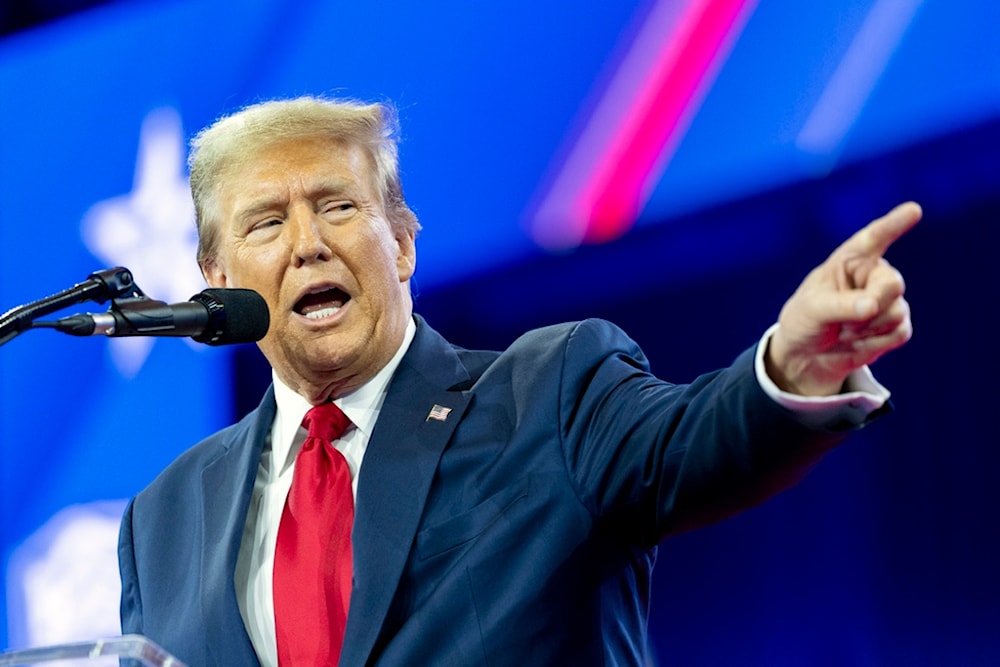Concerns mount in US intel community over possible Trump electoral win
Trump has previously attempted to overhaul intelligence agencies and is likely to try again if he wins a second term.
-

Republican presidential candidate former President Donald Trump speaks during the Conservative Political Action Conference, CPAC 2024, at National Harbor, in Oxon Hill, Md., Feb. 24, 2024 (AP)
Politico reported on Monday, citing former aides to Donald Trump's administration, that Trump will likely initiate a massive overhaul of the US' main spy agencies if he wins a second term.
Sources say that Trump has previously attempted to overhaul intelligence agencies and is likely to try again if he wins a second term. They added that Trump will likely target people whom he perceives as hostile to his political agenda and replace them with "inexperienced loyalists."
Doing so will shield Trump from information that does not align with his politics, they further said.
"He wants to weaponize the intelligence community. And the fact is you need to look with a 360-degree perspective. He can’t just cherry-pick what he wants to hear when there are so many US adversaries and countries that don’t wish the US well," said Fiona Hill who previously served as a senior official in the Trump administration. "If he guts the intel on one thing, he'll be partially blinding us."
Read more: FBI created dashboard to mislabel Twitter users as Russian bots
Trump normally requests that his aides be loyal to him. However, sources warn that when this demand extends to the intelligence community, it could have significant consequences.
If Trump is careless in handling classified information, as claimed in a June 2023 indictment against him, it could put individuals who provide valuable intelligence at risk, former director of national intelligence during Trump's presidency Dan Coats told Politico.
"People’s lives could be lost."
Trump constantly "under assault"
Trump's spokesperson Steven Cheung said that Trump has faced constant attacks since the start of his 2016 presidential campaign, citing grievances such as the intelligence community's handling of the Russia dossier, investigations into Russian interference, and skepticism about allegations against Joe Biden's son.
In the case involving classified documents, Trump's legal team argues that the intelligence community is already heavily politicized and is unfairly biased against Trump.
Read more: Putin says prefers more 'predictable' Biden over Trump
Other former senior officials said that many officials within the administration viewed the intelligence agencies as politically biased and bureaucratic. They also expressed support for the idea of replacing individuals within these agencies whom he perceives as disloyal if Trump were to be re-elected.
While appointing "controversial" figures may face challenges during the confirmation process, Trump could circumvent this by appointing "acting" directors or placing confidantes in non-confirmed positions — as he did in his first term.
Critics argue that such appointments may lack the necessary qualifications for the roles.
"The chief requirements for duty will be how quickly you say 'yes, sir,'" said John Bolton, Trump’s national security adviser between 2018 and 2019 and now a critic of the former president. “And I think that’ll apply to the DNI and CIA director in particular."
They noted that the revamping process could entail significant changes.
"Over time, if they’re truly intent on putting pliable people in top positions, you just have an eventual replacement of enough people where you have true corruption at that institution," said a former senior intelligence official.
Read more: Trump to 'encourage' Russia to attack NATO states for not paying bills
US journalists debunk claims on alleged Putin favoritism
Earlier this month, an investigation conducted by three American journalists revealed that the US intelligence community fabricated claims suggesting that Putin favored Donald Trump over Hillary Clinton in the 2016 US presidential election.
In January 2017, an Intelligence Community Assessment (ICA) released by the US Director of National Intelligence suggested that Putin preferred Trump to win the election.
However, after a thorough investigation, journalists Michael Shellenberger, Matt Taibbi, and Alex Gutentag found that the authors of the assessment fabricated intelligence regarding this claim.
The information was sourced from people close to a House Permanent Select Committee on Intelligence (HPSCI) investigation into the origins of the Trump-Russia scandal.
The report further states that the release of the HPSCI investigation findings is being obstructed.

 4 Min Read
4 Min Read








